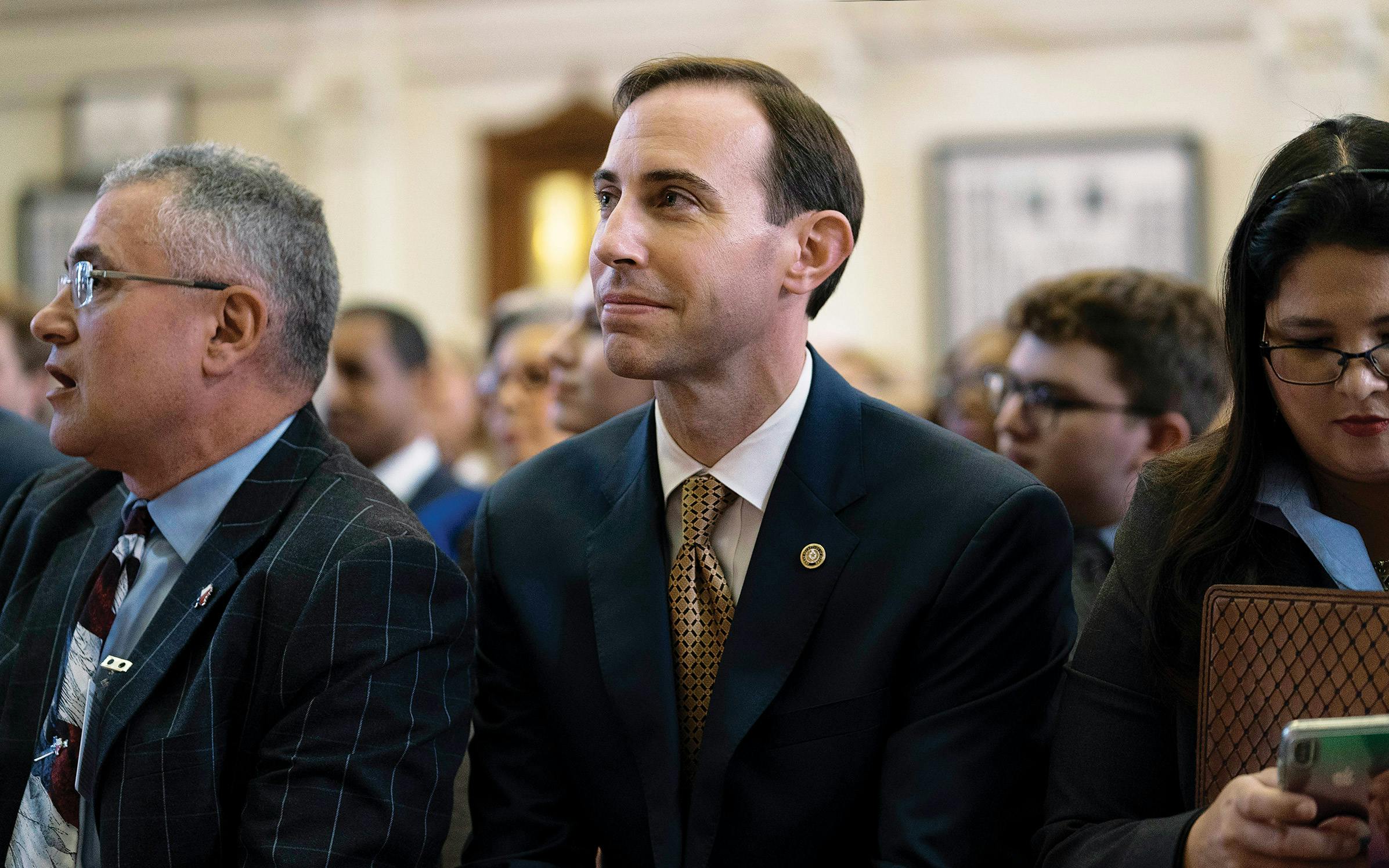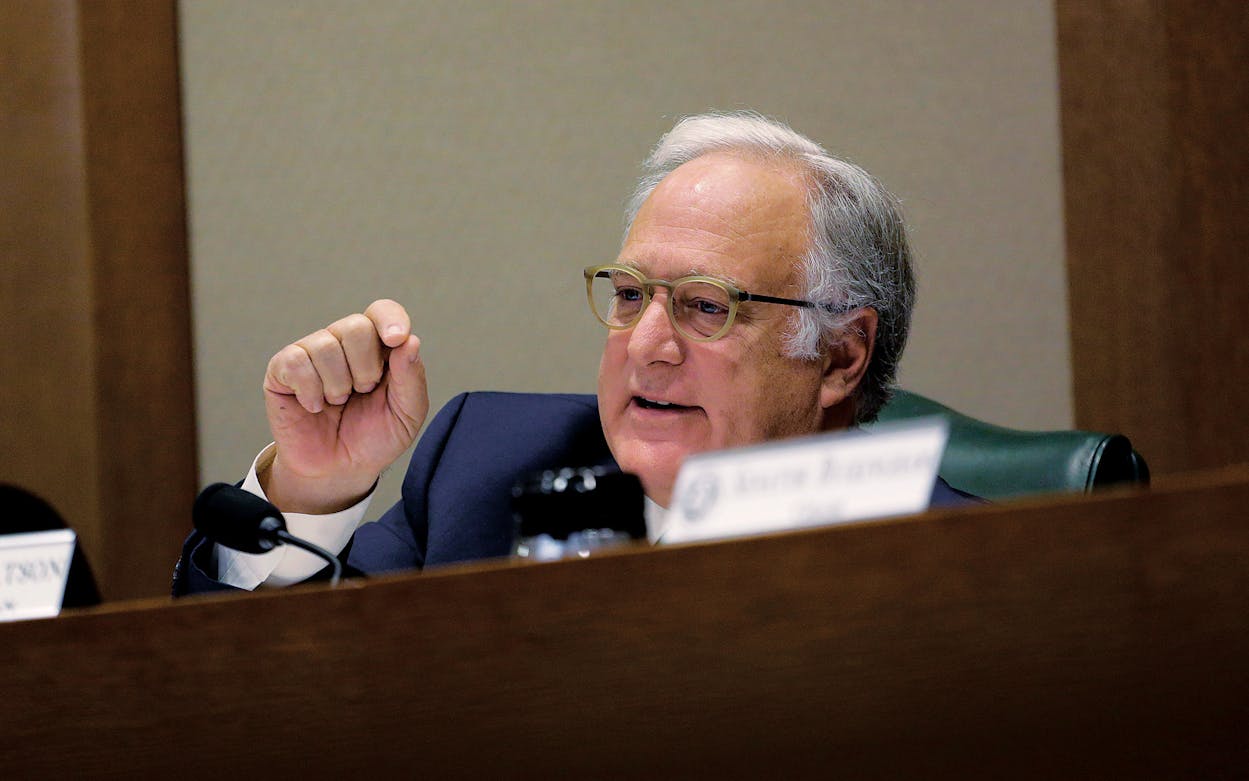In 1973, Texas Monthly rolled out its first edition of “THE Best and Worst Texas Legislators,” an annotated list of the Texas lawmakers who had brought the most honor and dishonor upon themselves and upon the legislative body during the just-ended legislative session. With this year’s iteration, we want to show our readers what’s on our minds as we deliberate on one of Texas politic’s most anticipated lists. So as the 86th Legislature progresses, we’ll be writing about the highlights and lowlights of the lawmakers as they happen in a new online feature called Best and Worst Legislators in Real Time.
“I am not satisfied with the answers”
Kirk Watson has never served as a prosecutor in a legal career that began after he graduated at the top of his class in 1981 from Baylor Law School. But the Democratic state senator from Austin showed some prosecutorial acumen this week as he took on Governor Greg Abbott’s nominee to be Texas’s 112th secretary of state and peeled back answers about the state’s latest voting rights scandal. For more than an hour, Watson, vice chairman of the Senate Nominations Committee, grilled the nominee and laid out a case that sets up the shocking possibility that, ultimately, Senate colleagues may not confirm Abbott’s choice. The reverberations of Watson’s performance and of a potentially failed nomination could change the tone of the entire session.
Watson methodically questioned Secretary of State David Whitley about what led to a January 25 release of what is formally known as Election Advisory No. 2019-02, which created a firestorm of political criticism and prompted three lawsuits so far. The advisory alerted county officials that the state had compared its voting rolls with a Department of Public Safety database of non-citizens and found as many as 95,000 matches. Further, Whitley’s office warned, as many as 58,000 people on this list may have voted at least once.
Read more: Texan Wrongfully Flagged For Possible Illegal Voting Joins Lawsuit Against Texas Officials
“The assumption in the press release that was sent out was that 95,000 individuals were non-U.S. citizens,” Watson said early in his line of questioning. “We know for certain, today, and your office knows for certain, that that’s incorrect.”
In answering questions by the senators, Whitley carefully weighed his words before each response and at times seemed evasive.
“If you’re asking whether or not there have been any confirmations that any of the 95,000 are in fact U.S. citizens, we have received information from counties that, yes, they are. And our guidance to them is … keep them on the rolls,” Whitley told Watson.
“Mr. Secretary, are you willing to admit as you sit here today that there were any mistakes made in sending out that list of 95,000 people?” Watson then asked.
“I think, Senator, what I would say to you today is that when we received the data from the DPS, we were confident that it was their best data to determine who in their database were non-citizens,” Whitley said. “And we compared that to [our] database to see who of those folks were registered to vote—and that’s where we came up with that top line.”
“So you’re not willing to say that any mistakes were made by your office?” Watson asked.
Repeatedly, Whitley stuck to talking points that he introduced in his opening statement to the committee. “Over the past two weeks my office has been engaged in a new list maintenance process,” he told the nominations panel made up of four Republicans and three Democrats.”It’s meant to give counties the information they need to keep our voter rolls up to date.” Whitley stuck to the concept that he was engaged in a routine list maintenance process in which his office played a collaborative role to help counties.

That provided Watson with an opening. “Would you agree with me that, at a minimum, the press release that you sent out on January 25 creates the appearance that you are accusing people of acting in an illegal manner?” Watson asked at one point.
“What I want to make clear is the secretary of state’s office has no investigative or prosecutorial authority,” Whitley said, repeating a contention he made throughout his hearing. “That’s why it was important for me to get the data into the hands of the counties that do have that investigative authority and the folks that actually have the statutory authority to do something.”
But Watson had already pointed out that Whitley’s news release indicated that the secretary of state’s office “immediately” sent its findings to Texas Attorney General Ken Paxton for possible prosecution. And Watson asked: “I want to pause there and say, in a routine maintenance activity, what was the sense of immediacy and urgency when you are telling us now that the goal was to get better information from the counties which you felt were in a better position to get that information?”
Whitley, an Abbott protégé and former aide to the governor, was nominated to become secretary of state last December before the state Senate was in session. Until Thursday, Abbott, Lieutenant Governor Dan Patrick, and new House Speaker Dennis Bonnen have spent the early days of the legislative session flaunting a newfound unity that they say they are hoping to leverage into passage of significant legislation having to do with property taxes and school finance reform.
But that veneer was shattered among several lawmakers when Whitley announced his elections advisory.
“For the past year, the Texas Secretary of State’s office has worked closely with the Texas Department of Public Safety (DPS) to evaluate information regarding persons identified to not be citizens of the United States,” said a news release, a document that itself is getting a lot of scrutiny. “This voter registration list maintenance activity is being conducted in accordance with federal and state law to ensure that only qualified voters—who must first and foremost be U.S. citizens—are registered to vote in Texas elections.”
The attorney general then tweeted a voter fraud alert 47 minutes after Whitley’s office sent the news release, raising the specter among critics that this was a coordinated political effort aimed to intimidate voters. Defenders, including Abbott, said the list was merely a work in progress aimed at a goal that all Texans can appreciate—accurate voting rolls.
VOTER FRAUD ALERT: The @TXsecofstate discovered approx 95,000 individuals identified by DPS as non-U.S. citizens have a matching voter registration record in TX, approx 58,000 of whom have voted in TX elections. Any illegal vote deprives Americans of their voice.
— Attorney General Ken Paxton (@KenPaxtonTX) January 25, 2019
Then President Trump jumped into the fray a few days later.
58,000 non-citizens voted in Texas, with 95,000 non-citizens registered to vote. These numbers are just the tip of the iceberg. All over the country, especially in California, voter fraud is rampant. Must be stopped. Strong voter ID! @foxandfriends
— Donald J. Trump (@realDonaldTrump) January 27, 2019
Read more: Introducing the Best and Worst Legislators in Real Time
Whitley had not commented publicly about the advisory or about the multitude of problems and the flurry of criticism that followed. Almost immediately after the list was released, for example, at least 20,000 names had been whittled off the original list of 95,000 names by county officials pointing out duplications in the list as well as people who had become naturalized citizens and were, therefore, eligible to vote.
The election advisory, issued weeks into a new session and just a month after Whitley assumed the post, opened an old wound that hung over lawmakers last session because of Senate Bill 4, the governor’s anti-sanctuary city bill: ethnic and racial tension among lawmakers. “It was troubling to members of the Mexican American Legislative Caucus that, at the outset, the inference was being made and then pushed by the Republican Party of Texas, the attorney general, and affiliated groups that somehow there was a large number of noncitizen voters who had voted since 1996,” Representative Rafael Anchia, a Dallas Democrat who heads the Mexican American caucus, said last week.
Since Whitley was appointed by Abbott before the legislature went into session, he is now subject to Senate confirmation, which requires a two-thirds vote of the upper chamber. Because there are nineteen Republicans in that chamber, that means that Whitley needs the votes of at least two Democrats as well as all Republicans. And on Thursday, Watson’s methodical questioning of Whitley brought the prospect of him getting those votes into serious doubt.
The committee delayed a vote for a week. although it is widely expected Whitley will win the panel’s approval. When his name is sent to the full Senate for their consideration, Whitley may encounter trouble, particularly considering Watson’s position when Thursday’s hearing ended. “I am not satisfied with the answers I received,” Watson told Texas Monthly.






